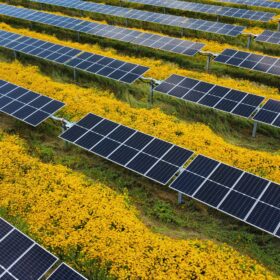Speeding interconnection through automation is a proven technology, says software executive
A major U.S. grid operator has shown that interconnection automation is feasible, but there is “much more to do,” said one software executive. Another said that eight transmission planners using his firm’s software can do the work of 80.
U.S. startup offers tin oxide, nickel oxide materials for flexible perovskite solar cells, modules
Sofab Inks, a spinoff of University of Louisville, said its transport layer materials enable perovskite solar cells with greater stability, efficiency, and scalability compared to incumbent materials.
Google aims to boost transmission capacity with advanced conductor upgrades
Google aims to help deliver more power to areas where it has data centers, by funding projects that increase the capacity of existing transmission lines using advanced conductors made by CTC Global. Large solar projects near reconductored lines could benefit.
Yes in my backyard: research rejects ‘NIMBY’ hypothesis for solar opposition
Most people who live near large-scale solar projects have positive or neutral feelings about the solar project and only 18% would be opposed to additional solar projects, found a national survey published in Frontiers in Sustainable Energy Policy.
Batteries are stabilizing the Texas power grid
A study by North American Electric Reliability Corporation found that ultra-fast response times of batteries help to stabilize the grid better than slower thermal sources.
Abandoned coal mines can host over 10% of global solar capacity
A survey of mines closed since 2020 and those planned to close by 2030 present an opportunity for installing nearly 300 GW solar on already-developed lands, finds a report from Global Energy Monitor.
Interconnection shake-out: 160 GW of solar advances as 12% of projects bow out
About one-sixth of queued solar capacity now holds signed interconnection agreements, signaling real progress even as developers pull more than 130 GW of projects amid tightening interconnection rules.
Connector failure accounts for loss of 58% of revenue in commercial solar portfolios
A report from HelioVolta finds connector issues in four out of five solar projects in the United States and details what can be done from procurement to field inspections to minimize risk.
Despite low gas prices, solar, wind remain cheapest sources of power in U.S.
Renewables remain cost-competitive in the United States despite rising natural gas competitiveness, according to Lazard’s 2025 “Levelized Cost of Energy+” report, which estimates combined cycle gas at $0.048/kWh to $0.107/kWh, solar at $0.038/kWh to $0.212/kWh, and nuclear at $0.141/kWh to $0.220/kWh.
Perovskite tandem provider Swift Solar to explore telecom tower integration
The MIT/Stanford spinoff announced a collaboration with American Tower Corporation to evaluate high energy density solar panels for telecom towers.















